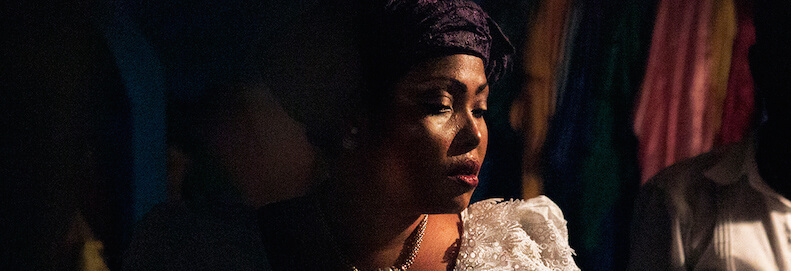Six years after the devastating earthquake in Haiti, Priestess Manbou Katy uses the spiritual practice of Vodou to comfort a still traumatized nation.
This article was made possible because of the generous support of DAME members. We urgently need your help to keep publishing. Will you contribute just $5 a month to support our journalism?
In an intense collaboration, Broadly and The Vaseline® Healing Project have joined together to shed light on the powerful and healing practice of Vodou in Haiti by following Vodou Priestess Manbo Katy as she provides a spiritual anchor for all those around her.
Conceived through the agony of slavery, Africans who were stolen and sold from their homes and heritage gave birth to Vodou on the island nation, making it much more than just an official religion. It is the soul, bone marrow, and heart of a people who embody God and creation. It is the beauty, mystery, power, and resilience that sustained Haiti through the Haitian Revolution, the most successful slave revolt in the Western Hemisphere.
And it continues to provide shelter and hope for many Haitians still recovering for the 7.0 earthquake that traumatized the nation in 2010, leaving 160,000 people dead—though the Haitian government estimates the death toll to be over 300,000—and 1.5 million displaced. And, in this video, we see them seeking community through Vodou in a world that has collapsed around them.
Vodou has come under attack and its practitioners vilified, as is often the case with African culture. In the film, viewers will see Priestess Katy experience casual judgment from a Haitian man who proudly tells her that he’s Baptist.
She does not respond with anger, nor does she judge his choice of religion. She simply tells the man that to practice Vodou, one must first know God. Viewers walk away from this moment with Katy, sure in the knowledge that people hate what they do not understand and seek to destroy what they fear. And cultural strangers who too often control the messages that we receive have successfully distorted the beauty of one of the world’s most beautiful religions.
This is largely why the video itself is so cathartic and compelling. The raw depiction of Vodou shatters the negative stereotypes that plague the religion, humanizing Black people who have been demonized by the stranglehold of white supremacist oppression. There is blood; there is joy; there is ecstasy and dancing. There is an unapologetic vulnerability evident as Earthquake survivors, women, children and men, seek the hope that Priestess Katy provides.
Perhaps one of the most powerful moments in the video is when a man who identifies himself as homosexual talks about having no safe space to just live and be free. Vodou provides that for him in a way that the United States, with all of its self-proclaimed religious superiority and moralizing has not been able to provide our own LGBTQIA communities.
Humanitarian organization Direct Relief also partnered with Vaseline for the project to “heal the skin of five million people living on the frontlines of crisis and disaster.” The juxtaposition of skincare with religion does not feel jarring because so much of it is ritual. So many of forget that to many people skincare feels like love.
It feels like healing.
And as Priestess Katy seeks to nurture those around her spiritually, so much of her work is tied to joy, beauty, the power of touch on warm skin, and the possibility of something better.
